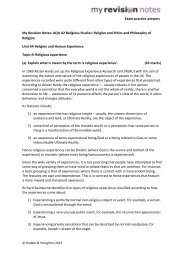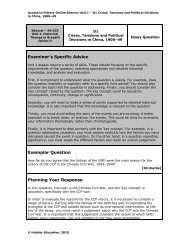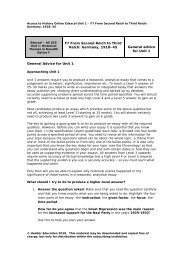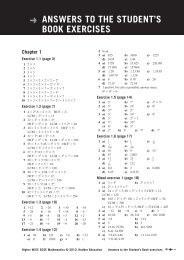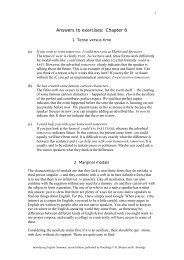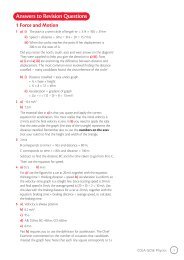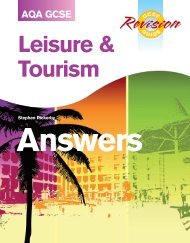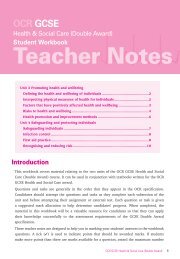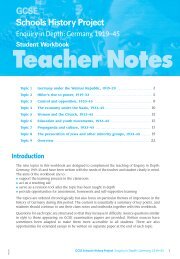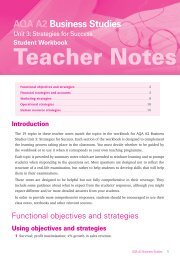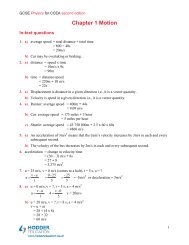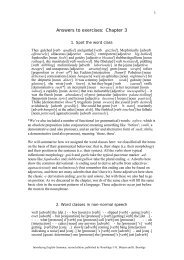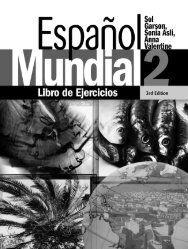Edexcel – Unit 1 - Access to History 2
Edexcel – Unit 1 - Access to History 2
Edexcel – Unit 1 - Access to History 2
You also want an ePaper? Increase the reach of your titles
YUMPU automatically turns print PDFs into web optimized ePapers that Google loves.
<strong>Access</strong> <strong>to</strong> His<strong>to</strong>ry Online <strong>Edexcel</strong> <strong>Unit</strong> 1 – A6 The Wars of the Roses in England, 1455–85balance and range, you will also need <strong>to</strong> evaluate the longer-term reasons forRichard’s defeat, such as the impact of his usurpation and Buckingham’s revolt, theintervention of foreign powers such as France, and the actions of individuals like theStanleys. A good answer will also take note of the word ‘solely’ as this will be animportant part of the overall judgement.One possible way <strong>to</strong> structure your answer could be:• Introduction: outline the reasons for Richard’s defeat, both short- and longterm• The Battle of Bosworth itself – Richard’s bad luck and poor strategy• The impact of Richard’s usurpation and Buckingham’s revolt• The role of Henry Tudor• The role of foreign intervention• ConclusionExaminer’s Exemplar Answer 1In 1483, Richard III <strong>to</strong>ok the throne from hisnephew Edward V. In 1485, Richard was defeated inbattle by Henry Tudor who became Henry VII.Richard was obviously very unlucky <strong>to</strong> lose in battleand Henry was very lucky <strong>to</strong> win (1).On 7 August 1485, Henry Tudor landed at MilfordHaven in South Wales with a small army. He thenmarched across Wales, recruiting men as he wentso that by the time he reached Bosworth he hadabout 5,000 men in his army. When Richard IIIheard about this, he ordered his loyal followers likeNorfolk <strong>to</strong> raise an army <strong>to</strong>o. Richard’s army hadabout 10,000 men in it, so it was much bigger thanHenry’s. Because Richard’s army was so muchbigger, he should have beaten Henry very easily,but instead, unluckily, he lost and was killed andHenry became king (2).When the two armies met at Bosworth, Richarddecided <strong>to</strong> camp on Ambion Hill. This was a goodidea as it gave him a tactical advantage. Richardwas expecting other powerful nobles such as theStanleys and Northumberland <strong>to</strong> join him. He hadeven taken Lord Thomas Stanley’s son hostage <strong>to</strong>make him fight for the king. Some chroniclers saythat Richard did not sleep well the night before thebattle, although this may be Tudor propaganda (3).On the day of the Battle, Richard was very unluckyin many ways. He expected Northumberland andthe Stanleys <strong>to</strong> fight for him, but this did nothappen as they were very unhappy at Richard’s(1) The introduction considersthe focus of the question, luckon the day of the battle, butdoes not raise other, longertermissues.(2) This paragraph is factuallyaccurate, but tends <strong>to</strong>wardsnarrative. The last sentencedoes, however, focus on luck.(3) Again, the paragraph isfactually accurate, but takesthe form of narrative whichdoes not answer the question.The point about Tudorpropaganda could be exploredand explained more.(4) This paragraph has betterfocus on the question andhints that there may havebeen reasons why some© Hodder Education, 2010



